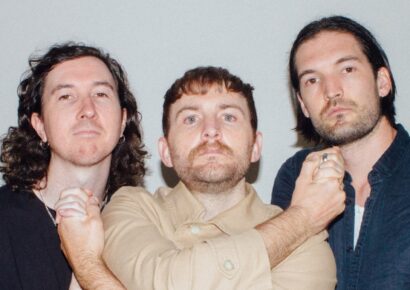Not for casual listening, Yirinda – which means 'Now' in Butchulla language – whispers sacred secrets and ancient wisdom in an endangered language.
The importance of documenting the Butchulla language, which is currently only spoken by a handful of people, cannot be overstated. As a song and language custodian for the Butchulla people from Queensland’s Fraser Coast region, which includes K’gari (formerly known as Fraser Island), Fred Leone – who lends his voice to this project – is one of just three Butchulla Songmen.
Did you know? Leone sang in language on his cousin Birdz’s powerful track Bagi-la-m Bargan, which was written from the perspective of a young Butchulla man witnessing Captain Cook sail past K’gari.
Keep up with the latest music news, features, festivals, interviews and reviews here.
Leone sings all of these songs in Butchulla as well, with voice the primary instrument. Although, according to Yirinda, this record was specifically designed “to give the listener an overwhelming sensory journey”: “We’re painting with sound in an emotional landscape.”
Drawing from a sonic palette of strings, horns, double bass, synth, piano and percussion, internationally acclaimed contrabassist/producer Samuel Pankhurst composes Yirinda’s evershifting, visceral sonic landscapes. Soothing moments luxuriate, momentarily, before they’re suddenly interrupted – like bird alarm calls warning of danger lurking in the shadows – by discordant pizzicato strings, yidaki or clap sticks. We totally get why Pankhurst, who has synaesthesia, is regularly commissioned to compose contemporary dance scores.
Backed by elongated strings, Yuangan (Dugong) opens the record like a consoling ritual. Leone has said that reimagining “this migrational song of hunting and feasting on dugong” – the original version of which was recorded circa 1960 and is currently stored at the University of Queensland Anthropology Museum – was his “deliberate reclamation of such materials”.
Aunty Nay Nay Bird, an Elder of the Butchulla people and the Wonnamutta clan, gifted Leone the lyrics for Thurum Voi (Look Here) “shortly before the visit from the Duke and Duchess of Sussex to K’Gari in 2018”. This clap sticks-driven track, he reveals, “is a song calling Biral (Butchulla God) down to earth to guide the Butchulla people. Biral is the great sky spirit who ordered the creation of Butchulla country, sea and people”.
Something about the ominous, descending bass chords of Nyun (Brother) call Björk’s Hyper-ballad to mind, before incantations and sawing strings usher in an unsettling intensity. Twinkling chimes that evoke fish flapping about in shallow waters open Guyu (Fish). Later, vast, enveloping brass drone and layered vocals represent deeper waters.
The penultimate Ba Gi Lam (Fighting) – with its arrhythmic instrumental elements, Leone’s chanting and rolled ‘rrrrrrrrrrrrrrr’ vocalisations – is an energetic shift. Don’t get any ideas about popping Yunma (Sleep) on your bedtime playlist! This instrumentally twitchy closer agitates, with repeated synth melodies bringing playground taunts to mind.
Thousands of generations of songlines and culture inform Yirinda, which can be deeply felt and also visualised. Don’t try to multitask, just listen intently to this Meanjin/Brisbane duo’s debut self-titled album. Preferably in nature.
LABEL: CHAPTER
RELEASE DATE: OUT NOW







